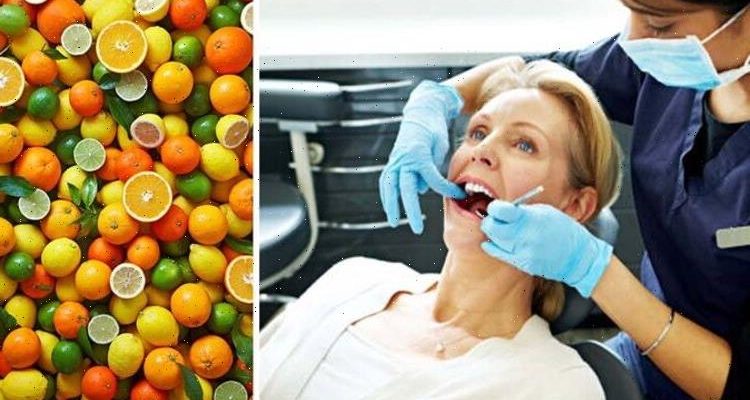Teeth whitening: Dentist discusses at home methods
We use your sign-up to provide content in ways you’ve consented to and to improve our understanding of you. This may include adverts from us and 3rd parties based on our understanding. You can unsubscribe at any time. More info
The NHS explains brushing your teeth twice a day with fluoride toothpaste and having regular check-ups with a dentist can help to keep your teeth healthy. Nonetheless, there are some foods which can damage your teeth. Indeed, the health body explains: “Diet, smoking and drinking alcohol also have an effect on dental health.”
Dr Khaled Kasem, Chief Orthodontist at orthodontics chain Impress says citrus can damage your teeth.
He said: “Oranges, lemons, limes, and grapefruit are all tasty as both fruits and juices and are known for being packed with Vitamin C.
“Just make sure to keep an eye on the amount you’re consuming, however, as they are very acidic and can erode enamel, making your teeth more susceptible to decay over time.”
Other foods can also have negative impacts. Indeed, it is well known that limiting the amount of sugar you eat and drink is important to prevent tooth decay.

The NHS warns a lot of the sugars we eat and drink are in food and drinks such as fizzy drinks, fruit juice, jams, marmalades, and dried fruit.
The health body says: “Sugars occur naturally in foods such as fruit and milk, but we don’t need to cut down on these types of sugars.”
But it warms that when fruit is juiced or blended, as in smoothies, the sugars are released from the structure of the fruit.
“Once released, these sugars can damage your teeth, so it’s best to drink fruit juice or smoothies at mealtimes,” it says.
Further to this, there are foods which can stain teeth. The NHS says wine, cigarette smoke, tea and coffee are all teeth-staining culprits. Keep them to a minimum to stop your teeth becoming stained.
It says: “Your dentist or hygienist can give your teeth a professional clean, which may help reduce the staining.”
The American Dental Association (ADA) says: “Your mouth, teeth, and gums are more than just tools for eating. They’re essential for chewing and swallowing—the first steps in the digestion process.
“Your mouth is your body’s initial point of contact with the nutrients you consume. So what you put in your mouth impacts not only your general health but also that of your teeth and gums. In fact, if your nutrition is poor, the first signs often show up in your mouth.”
The ADA says for dental health, it’s recommended that people limit eating and drinking between meals.
The organisation says: “Of course, sometimes eating between meals must happen.
“Unfortunately, most people choose foods like sweets and chips for snacks; foods that harm teeth by promoting tooth decay.
“If you do snack, make it a nutritious choice—such as cheese, yoghurt, fruits, vegetables or nuts—for your overall health and the health of your teeth.”

Fortunately, there are also foods that can help with your dental health.
Dr Khaled Kasem said: “Blueberries have very low sugar content and are known for their antioxidant properties, which helps to prevent our gums from suffering from diseases such as gingivitis or periodontitis.”
He added: “A firm favourite for snacking, chocolate actually helps to fight tooth decay because its grain contains strong antibacterial agents.
“That doesn’t mean you should eat chocolate in excess, though, but a small amount is enough to keep the decay at bay.”
Source: Read Full Article
